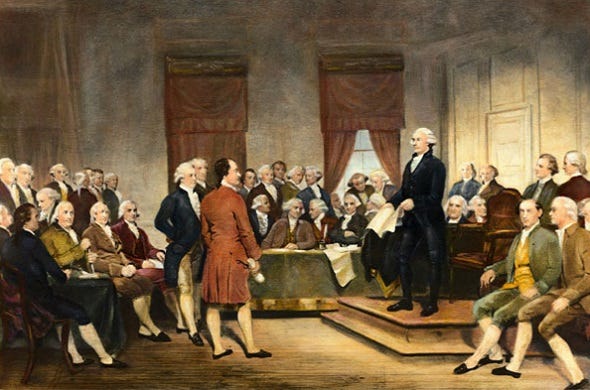American hegemony, if you can keep it
Don't take everything we have for granted.
American founding father Benjamin Franklin's famous remark, "A republic, if you can keep it," was made in response to a question posed during the Constitutional Convention. As the story is told, a peer asked Franklin whether the delegates had given the United States a monarchy or a republic. Franklin’s short but significant reply underscored the nature of the government they had crafted — a republic — and it emphasized the responsibility of the people to maintain it.
Please check out our sponsor of the day. It helps to support The Dossier. Thank you!
Pet insurance will help you offset rising vet costs.
Veterinarians nationwide report that corporate managers encourage them to upsell services, creating a growing burden for pet owners. Pet insurance will help offset these costs up to 90%.
View Money’s top pet insurance picks to see plans starting at only $10/month.
Franklin’s statement reflected the Founders’ understanding of history and human nature. The American republic demands the active participation and virtue of its citizens and leaders. He was likely alluding to the fragility of even the most well-organized systems, which had often crumbled in the past due to corruption, apathy, or factionalism, with Rome’s transition from republic to empire being a handy example both then and now. The Constitution they’d just drafted wasn’t a self-sustaining machine. Despite being the most moral and brilliant framework of governance in human history, it still required from its people vigilance, civic duty, and a collective commitment to endure.
The phrase itself serves as a challenge to Americans: the republic’s survival isn’t guaranteed. It’s on you, the people, and our leaders to preserve it.
Given the debates of the time over centralized power, geopolitical competition, individual rights, and the risks of tyranny, Franklin was nodding to the delicate balance they’d struck and the effort it would take to hold it together.
Fast-forward almost 250 years, and America finds itself facing a new series of challenges in maintaining its long-held position as the most powerful nation on earth, both from a civilizational and moral perspective.
American hegemony in global affairs remains essential for both our country and the forces of self-government to thrive.
For centuries, the U.S. has played a key role in maintaining the sovereign state landscape we are witnessing today, which sometimes referred to as the system "Pax Americana." America has facilitated a system that has witnessed an absence of a major world war for 80 years.
The U.S. dollar as the world’s reserve currency facilitates global trade, keeps markets (relatively) honest, and gives countries a reliable economic anchor. American-led markets have lifted hundreds of millions out of poverty by opening markets and spreading innovation, and so much of it remains driven by U.S. companies.
And there’s the spread of our values. American hegemony obviously pursues American values, which improves both domestic and foreign governance. Critics might call it colonialism or imperialism or what not, but you would be insane to argue it’s not a net positive when faced with competing systems under Beijing rule.
On the security front, U.S. military power acts as a deterrent. In particular, the U.S. Navy has a vital interest in keeping the sea lanes open and ensuring trade flows smoothly, which keeps America’s position in the global order. Unfortunately, some of our allies have taken the short sighted approach and dropped the ball on defense spending because they’re under the American umbrella, freeing up their resources for other priorities. Still, American military power cannot be relinquished in the face of these frustrations.
Today in 2025, far from being the world’s lone dominant force, we find ourselves with fierce competition — in particular, from our adversaries in China — in this increasingly multipolar geopolitical environment.
We cannot take for granted that America has the biggest economy, the strongest currency, the most robust alliances, and the best military in the world and will always be that way. It would be unwise to believe these achievements are now permanent or owed to us in perpetuity because we are the United States of America, and because of that, we deserve the best circumstances. Our leaders cannot become complacent or reckless in the face of our many challenges in 2025.
Our alliances across continents are getting more complicated due to various factors. And yet, they must be maintained, because an America that goes at it alone cannot win in this world. After all, it’s better to have difficult friends than to have no friends at all. Our adversaries are relentlessly challenging our commitment to our allies, and they are constantly trying to position themselves as welcoming arms in the face of a scenario in which America employs retreat and isolationism.
Our country maintains itself as a unique economic power, one where innovation continues to thrive, but that competitive advantage can slip away if our leaders pursue destructive, hubris-fueled policies. Europe is witnessing a devastating brain drain because its leaders have pursued overregulation, restrictive economic policies, and plenty of additional catastrophic social policies. America needs to remain the country where anyone and everyone can carve out a successful life and business without the government making it impossible for citizens to thrive.
America is a rich country, but it can fast become a poor country. America has incredible global influence and power, but this republic can decline along with its standing worldwide. Our citizens and political leaders must adapt and never take our proud history for granted.
American hegemony must be maintained and advanced in the face of our time's unique challenges. Too many of our political leaders, both on the left and right, have a massively inflated self-perception of near invincibility, and this level of unrestrained hubris can result in potential disaster.
Americans must stay true to our exceptional ideals and continue pushing the envelope against our rivals as if the competition is right on our heels. Our exceptional system still has no peer, and leaning on our principles will continue providing guidance for retaining America’s number one standing long into the future.






You can have a republic or an empire. Pick one. Republics are relatively rare in history so it is hard to get a significant correlation but there are examples. The Roman Republic could not cope with governing an empire (which predated the Empire) and devolved into civil strife and eventually civil war. The Venetian and Dutch republics were victims of overstretch and could sustain themselves. The American republic is showing the strain of trying to run the world
I would add that in addition to our elected leaders, American citizens certainly need to take more responsibility for our collective and individual outcomes. We often don't take elections seriously enough, and most people don't take the time to study how our votes will direct our future.
We are also far too willing to place the blame on others and at the same time ask for handouts and avoid self-reliance.
A lot of what Schachtel states here should be (but isn't) taught in grade school.